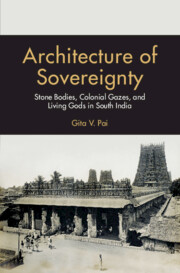Book contents
- Frontmatter
- Dedication
- Contents
- List of Figures
- Acknowledgments
- Notes on Transliteration and Spelling
- Introduction: Sovereignty’s Trace in Architectural Forms
- Part I Stone Bodies
- Part II Colonial Gazes
- Part III Living Gods
- Epilogue: Rejecting the State—Priestly Devotion and Protest in Modern Madurai
- Bibliography
- Index
2 - Co-opting a Local Goddess in Madurai: From Warrior Queen to Śiva’s Consort to Political Pawn
Published online by Cambridge University Press: 19 April 2023
- Frontmatter
- Dedication
- Contents
- List of Figures
- Acknowledgments
- Notes on Transliteration and Spelling
- Introduction: Sovereignty’s Trace in Architectural Forms
- Part I Stone Bodies
- Part II Colonial Gazes
- Part III Living Gods
- Epilogue: Rejecting the State—Priestly Devotion and Protest in Modern Madurai
- Bibliography
- Index
Summary
Introduction
Madurai's most famous temple is dedicated to Mīnākṣī (‘the fish-eyed one’), a queen of Madurai's Pāṇḍyan kingdom who is regarded as a manifestation of the pan-Indian goddess Pārvatī. The temple also houses her consort, Sundareśvara (‘the beautiful lord’), similarly understood to be a local version of the pan-Indian deity Śiva. Every Cittirai month (April/May) in the Tamil Hindu calendar, more than one million devotees descend upon the temple town to witness the reenactment of the gods’ sacred union in a twelve-day celebratory marriage festival. The crowd watches as metal embodiments of the divine couple, dressed in colorful silks and floral garlands, marry on a flower-decked stage and commemorate their nuptials by circumambulating the temple in gigantic wooden chariots through Madurai's streets.
The temple sits on the flat, sandy plain along the river Vaigai. It occupies the geographic and ritual center of Madurai, a city laid out in the shape of a square with a series of concentric streets radiating from the temple like petals around a lotus flower. Mīnākṣī is one of the few Hindu female deities to have a major temple devoted to her: the fish-eyed goddess never blinks, and devotees consider her to provide constant, watchful protection of the town. As a major pilgrimage site, the temple attracts 15,000 visitors on average days, approaching twice that number on Friday, the goddess's sacred day.
The Mīnākṣī-Sundareśvara temple premises, in particular the Pudu Maṇḍapam at the complex's east gateway, represent a critical intersection of architecture and sovereignty in early modern south Indian government. Temple ceremonies for Mīnākṣī helped Madurai's seventeenth-century ruler Tirumala Nāyaka establish himself as the goddess's designated heir, by crafting a political identity around rituals that performed a relationship of partnership, interdependence, and exchange between the goddess and the king. Tirumala altered sacred prescriptions and reconstituted ritual traditions into vehicles for his own royal self-fashioning through mass public performances linked to the rhythms and cycles of seasonal labor in the Tamil region. Mythological texts, sculptural reliefs, and religious festivals connected to the Madurai temple help us trace Mīnākṣī's transformation from soldierly heir to her father's throne, to submissive wife of her god-husband, to political pawn of a devout king.
The emergence of a local goddess in Madurai
Goddess worship is a vital aspect of Hindu religious life, involving devotion to female village deities, pan-Indian goddesses, and esoteric, tantric figures.
- Type
- Chapter
- Information
- Architecture of SovereigntyStone Bodies, Colonial Gazes, and Living Gods in South India, pp. 53 - 90Publisher: Cambridge University PressPrint publication year: 2023



